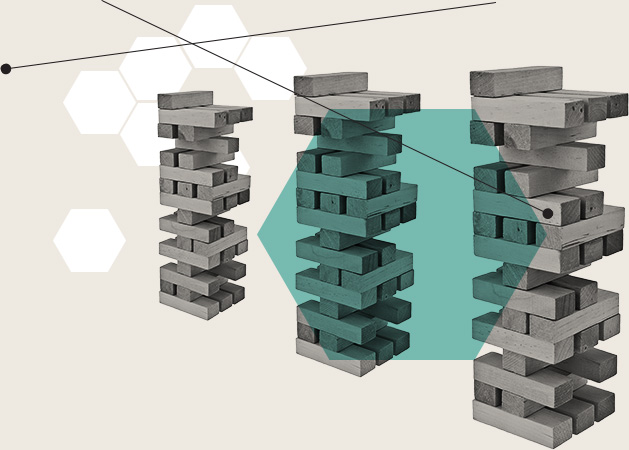2018-2019
scroll

The past year was one of reflection as we imagined the future of our organization. With our strategic plan 2013-2019 coming to an end, we embarked on perhaps the most ambitious consultation in our association’s history to chart our course for the next five years.
Our Imagine the Future campaign took us online and across the country to meet with members, partners, staff, and key stakeholders in order to discuss the future of colleges and institutes, and the role of CICan as their national voice. Throughout this ambitious process, our team heard from hundreds of people.
This period of reflection took place as post-secondary leaders everywhere try to anticipate what the future of work and learning might look like, as new, potentially disruptive, technologies emerge. No shortage of ink was spilled on the topic in the past few years, but we are arriving at a point where actions are starting to take shape.
It’s no surprise then that in March, the federal government introduced a “skills budget”, perhaps the most college-friendly federal budget we have seen in years.
This only validates that the value proposition of colleges and institutes resonates across the country and is stronger than ever. As we look to the future of CICan and its members, we firmly believe that the best is yet to come!



CICan is proud to be the national voice of Canada’s colleges and institutes and has worked tirelessly over the past year to ensure their priorities are heard and understood by Canadians and key decision makers.

As the voice of colleges and institutes in Ottawa, we joined forces with other organizations this year to advance our members’ priorities, including the need to support upskilling and reskilling in order to help Canadians adjust to changes in the labour market. We worked with Universities Canada to submit proposals on student mobility and market diversification for international recruitment. We also worked with Polytechnics Canada, Tech-Access Canada, la Fédération des cégeps, and l’Association pour la recherche au collégial to highlight the need for stable research support funding for our members’ applied research activities. Finally, we partnered with the Business/Higher Education Roundtable, Co-operative Education and Work-Integrated Learning (CEWIL) Canada and many other stakeholders to promote work-integrated learning as a critical aspect of preparing Canadians for the jobs of tomorrow.
We also worked closely with Immigration, Refugees and Citizenship Canada (IRCC) and consulted with members on a range of issues with relevance to international students, including the launch and expansion of the Study Direct Stream and biometrics, to ensure that policy and program criteria reflect the interests of our members
These efforts were well received by the federal government, which delivered a very college-friendly budget, on March 19, that was introduced from the get-go as a skills budget.
Budget by the numbers:

We contributed to multiple federal consultations this year, through written submissions or by appearing before committees.

CICan’s advocacy efforts were supported by a variety of communications activities targeting national and regional media. Over the year, we published op-eds, provided interviews and were featured in media such as the Globe and Mail, CBC, HuffPost, Maclean’s, the Hill Times, the PIE News, Study Travel Magazine, and Le Droit.
We also continued working with Marketzone Productions to publish Education for Employment Magazine, which is distributed with Canadian School Counsellor Magazine and Careering Magazine, as well as the Globe and Mail to produce a special feature on colleges and institutes that focused on the future of work. Additionally, we collaborated with Re$earch Money to create a special feature called Applied Research Comes of Age and a blog on their website. We also offered support to le Droit who created Canada’s first guide to francophone post-secondary institutions.
Throughout the year, we maintained a strong presence on social media, growing our audience considerably across all our platforms.
Growth in social media followership (April 1st 2018 to March 31, 2019):

Colleges and institutes across the country will benefit from a strong and passionate voice on the newly created Future Skills Council, as CICan CEO Denise Amyot was named as one of its 15 members.
The Council will advise government and inform the priorities of the new Future Skills Centre which was launched on February 14 by the Honourable Patty Hajdu, Minister of Employment, Workforce Development and Labour, along with the Honourable Bill Morneau, Minister of Finance. Operated by a consortium led by Ryerson University, the Future Skills Centre will support projects across Canada and be responsive to regional differences. It will operate at arm’s length from government and has been mandated to develop, test and rigorously measure new approaches to skills assessment and development.

With a federal election planned in the Fall of 2019, CICan’s advocacy work has focused on preparing an election strategy to ensure colleges and institutes are heard by all parties during the campaign.
We created a brand-new committee, gathering college and institute professionals working in communications and government relations, to advise our team and further improve our advocacy efforts. The CICan Government Relations and Communications Advisory Committee met for the first time in December, building on work done by our Government Relations Network in the past two years.

CICan is dedicated to empowering members by facilitating a variety of programs and offering services that help them achieve their goals. From representing them on the international stage to providing professional development, our association is always driven by an unwavering commitment to our members.

Throughout the year, CICan members had the opportunity to gather together to reflect and discuss priority issues and did so in record numbers. Overall, our Leaders Forum and Applied Research Symposium, both held in Ottawa, from November 5-6, as well as our Indigenous Education Symposium (October 14 to 16) were incredibly well attended.
In May, our annual national conference was held in Victoria, BC, with the theme Na’tsa’maht, or working together as one in the Lekwungen, SENĆOŦEN, and Hul’qumi’num languages. It was a rousing success with nearly 1000 participants!
For the first time this year we also organised a continuing education symposium, in collaboration with la Fédération des cégeps, held in Montreal from February 28 to March 1st. Representatives from 60 different colleges and institutes, as well as participants from universities, external organizations, and government took part in the event.
On December 7th, we also co-organized a Research Data Summit with Centennial College and Research Data Canada. This one-day workshop was an opportunity to discuss new approaches to data management and review the latest Tri-Council policy.

The 2018 CICan Leadership Institutes were more popular than ever, with an overall increase in participation across all eight institutes. This included a brand-new institute for international leaders in French last November.
We also offered seven different webinars over the year on a wide variety of topics, including: Supporting International Student Transitions to Permanent Residency, Mitacs Research Internships for College and Institute Students, Trends in International Mobility for Francophone Students, and Building the Car of the Future, in collaboration with the Automotive, Transportation and Digital Technologies Branch (ATDTB) at Innovation, Science and Economic Development Canada (ISED).

Over the year, we also organized many events overseas along with international partners and stakeholders. This included recruitment and marketing missions for CICan members, as well as forums and meetings aimed at sharing expertise and best-practices through our different Education for Employment (EFE) programs.

Our members across the country remain dedicated to supporting reconciliation with Indigenous peoples and are leaders in this regard. Throughout the year we added nearly a dozen colleges and institutes to the list of CICan Indigenous Education Protocol signatories, bringing us to a total of 64.
We were also very proud to host our 10th Indigenous Education Symposium in Wendake, Quebec. This was our first symposium held on a reserve and it attracted more participants than ever before, with over 175 delegates from colleges and institutes across the country.

CICan is proud to serve as Canada’s knowledge hub on the college and institute system, gathering data and producing studies to both improve understanding of the Canadian post-secondary sector and support our advocacy efforts, nationally and internationally.

This year we worked with D2L, a global learning technology leader, to produce a Canadian version of the whitepaper “The Future of Work & Learning in the Age of the 4th Industrial Revolution”. This exclusive paper calls for a fundamental transformation in how we think about lifelong learning and skills development in a fast-changing world. It was launched on November 6 in Ottawa, during our Leaders Forum and Applied Research Symposium.

With financial support from Global Affairs Canada through the Global Opportunities for Associations (GOA) Program, we undertook a substantial research project on emerging markets for international student recruitment to Canadian colleges and institutes. Published in March, this work provides members with valuable insights and strategies to capitalize on emerging trends and opportunities in support of international student diversification efforts. It shows strong and growing global demand for Canadian technical and professional education.
Highlights from the report:

This year we worked to gather data about the Canadian college and institute system in order to paint a more precise picture of its reach and contributions to Canada’s key economic sectors.
Over 95% of Canadians, including 86% of Indigenous people, live within 50km of a college or institute location.

Over the past year we implemented a customer relationship management system using Microsoft Dynamics software. CIConnex not only helps us improve communications with members and stakeholders, but also allows us to collect high-quality information to help us adopt a data-driven engagement strategy.

In April we delivered an environmental scan of college and institute construction and renovation programs in order to inform the preparation of Natural Resources Canada’s new model building code. The study presented an overview of programs offered across the country and identified best practices, as well as existing gaps.
This was a first for us, as we move to produce more such environmental scans in collaboration with different stakeholders. By driving knowledge on the college and institute system, we are actively supporting sound and efficient policy-making.

Whether with members, other associations, government or industry, collaboration is at the heart of all of CICan’s activities. With multiple ongoing projects around the world, we were able to create new opportunities for our members this year, thanks to innovative partnerships, both at home and abroad.



In August, we launched the new Digital Tech internship stream to help Canadian youth acquire the skills and experience they need to succeed in the digital economy. This two-year initiative, funded by Innovation, Science and Economic Development Canada (ISED)’s Digital Skills for Youth program, will allow 440 underemployed recent graduates to connect with local employers and gain hands-on work experience.
The new internships will be offered through CICan’s successful Career-Launcher Internship program.

On January 22, CICan hosted the Minister of Immigration, Refugees, and Citizenship Canada (IRCC), the Honourable Ahmed Hussen, who announced the renewal of the Canadian Immigration Integration Program (CIIP).
This new phase for Planning for Canada represents an $18 million investment over four years and builds on CIIP’s past success in pre-arrival support services.
CIIP connects newcomers with a variety of services and supports, including those offered by colleges and institutes, to accelerate their integration into communities and in the workplace. Under the new Contribution Agreement with IRCC, CIIP will continue to operate field offices in India and the Philippines and will deliver online programs worldwide.
Since its inception in 2007, the program has served over 48,000 newcomers destined to all parts of Canada.

Throughout the year, we excitedly welcomed both new and returning members.
Every year, we celebrate the accomplishments of the college and institute system with our Awards of Excellence, our Distinguished Service Award, and our Outstanding Partner Award. We also celebrated student artists with an Art Showcase and competition. All of the recipients were celebrated at our annual conference in Victoria.

As a member-focused association, CICan is committed to adopting governance and management practices that will help us function in the best interest of our members by using evidence-based decision-making. This concept was front and centre this year as we implemented new processes to improve governance and overall efficiency within the association.

In 2018, we launched one of the most extensive consultations in our 46-year history to have meaningful conversations and develop a plan to guide our work for the next five years. Throughout this ambitious process, our team heard from more than 250 people, through online consultations and meetings with members, partners, staff, and key stakeholders from across the country to discuss the future of colleges and institutes, and the role of CICan as their national voice. This included six regional roundtables hosted by our members across the country, one-on-one meetings, online polls, and more.

We created or updated several internal strategies in 2018-2019, that will help make CICan more efficient and responsive to the needs of our members.

As part of our new international strategy, launched in January 2018, we adopted a series of measures to further develop our international presence. These will help diversify sources of funding for our different projects and find new international opportunities for CICan members. Among the steps taken this year, we hired a Business Development Coordinator and created a project pipeline monitoring tool to systematically track and seize opportunities.

Having adopted a new Quality Policy in 2018 to align our processes to the ISO 9001:2015 standards, our ISO designation was successfully renewed. This included a big push to modernize the treatment of most financial requests by implementing online forms to replace the old paper-based system. Going forward, we are now able to treat most transactions, including contracts, online, making processes more efficient, saving both time and paper!
Over 950 documents were scanned during the year as we moved to replace our old filing system.
The accompanying summarized financial statements of the Colleges and Institutes Canada are the responsibility of management. They have been derived from the Association’s complete financial statements which have been prepared in accordance with generally accepted accounting principles using information available to May 15, 2019, and management’s best estimates and judgements.
Management has developed and maintains a system of internal controls to provide reasonable assurance that all assets are safeguarded and to produce relevant, reliable and timely financial information, including the accompanying financial statements.
The Board of Directors discharges its duties relating to the financial statements primarily through the activities of its Audit Committee. The Audit Committee meets at least annually with management and the external auditors to review both the financial statements and the results of the audit examination with respect to the adequacy of internal accounting controls. The external auditors have unrestricted access to the Audit Committee. The Audit Committee also considers, for review by the Board of Directors, the engagement and re-appointment of external auditors.
The financial statements have been audited by Deloitte LLP on behalf of the membership. The Board of Directors met on May 24, 2019 and approved the financial statements.


May 24, 2019
March 31, 2019, with comparative figures for 2018
2019 |
2018 |
|||
| Assets | ||||
| Current Assets | $ | 20,448,734 | $ | 14,389,856 |
| Investments | 2,530,677 | 2,457,568 | ||
| Capital Assets, net | 797,536 | 898,523 | ||
| Intangible Assets | 164,728 | 255,063 | ||
| $ | 23,941,675 | $ | 18,001,010 | |
| Liabilities and Net Assets | ||||
| Current liabilities | $ | 19,608,431 | $ | 14,202,635 |
| Lease Inducements | 157,795 | 179,313 | ||
| Net Assets | 4,175,449 | 3,619,062 | ||
| $ | 23,941,675 | $ | 18,001,010 | |
| Summarized Statement of Operations | ||||
| Year ended March 31, 2019, with comparative figures for 2018 | ||||
2019 |
2018 |
|||
| Revenue: | ||||
| Project Revenue | $ | 23,627,064 | $ | 27,983,313 |
| Less: direct Project Expenses | 17,193,517 | 21,263,705 | ||
| Net project contribution | 6,433,5478 | 6,719,608 | ||
| Membership fees | 2,983,929 | 2,873,017 | ||
| Other | 404,564 | 288,447 | ||
| 9,822,040 | 9,881,072 | |||
| Expenses: | ||||
| Human resources | $ | 8,275,272 | $ | 8,160,102 |
| Amortization of capital assets | 193,863 | 226,856 | ||
| Other | 1,805,100 | 1,358,258 | ||
| 10,274,235 | 9,745,216 | |||
| Excess (deficiency) of revenue over expenses | ||||
| before undernoted items | $ | (452,195) | $ | 135,856 |
All of the achievements listed in this annual report would not have been possible without the continued support of our members and of our many partners in industry, government, and from other associations in Canada and around the world who share our commitment to excellence in education.
Thank you also to the remarkable members of our Board of Directors, for sharing their time and knowledge, as well as to all the individuals involved in our various advisory committees whose input ensure we continue to meet the needs of our member institutions.
Finally, thank you to the entire staff of CICan for their continued hard work and dedication.